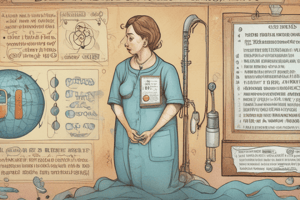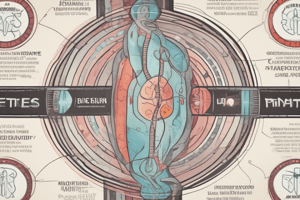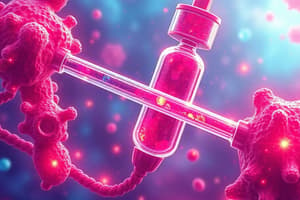Podcast
Questions and Answers
What is an important aspect of a healthy lifestyle for diabetes management?
What is an important aspect of a healthy lifestyle for diabetes management?
- Ignoring blood glucose monitoring
- Consuming high amounts of added sugars
- Decreasing physical activity
- Choosing complex carbohydrates (correct)
What is a risk factor for unstable blood glucose levels?
What is a risk factor for unstable blood glucose levels?
- Regular exercise and healthy eating
- Frequent blood glucose monitoring
- Inadequate insulin use and irregular diet (correct)
- Proper use of insulin and balanced nutrition
What is an important aspect of comprehensive education for diabetes management?
What is an important aspect of comprehensive education for diabetes management?
- Focusing solely on medication adherence
- Ignoring blood glucose monitoring and dietary guidelines
- Avoiding exercise and stress
- Proper use of insulin and health teaching about diabetes (correct)
What is a potential consequence of high blood sugar levels and frequent injections?
What is a potential consequence of high blood sugar levels and frequent injections?
What is evidenced by patient questions and misunderstanding of diabetes care?
What is evidenced by patient questions and misunderstanding of diabetes care?
What is diabetes according to the World Health Organization (WHO)?
What is diabetes according to the World Health Organization (WHO)?
What is characterized by deficient insulin production and requires daily administration of insulin?
What is characterized by deficient insulin production and requires daily administration of insulin?
What is gestational diabetes?
What is gestational diabetes?
What is a risk factor for type 2 diabetes?
What is a risk factor for type 2 diabetes?
What is a normal blood sugar level?
What is a normal blood sugar level?
What is a sign of diabetes?
What is a sign of diabetes?
How can type 1 diabetes be prevented or delayed?
How can type 1 diabetes be prevented or delayed?
What type of diet is recommended for people with diabetes?
What type of diet is recommended for people with diabetes?
Flashcards are hidden until you start studying
Study Notes
What is Diabetes?
- Diabetes is a chronic disease that occurs when the pancreas doesn't produce enough insulin or when the body cannot effectively use the insulin it produces.
- There are three main types of diabetes: type 1, type 2, and gestational diabetes.
Type 1 Diabetes
- Characterized by deficient insulin production, requiring daily administration of insulin.
Type 2 Diabetes
- Affects how the body uses sugar (glucose) for energy, stopping the body from using insulin properly, leading to high levels of blood sugar if not treated.
Gestational Diabetes
- A type of diabetes that occurs during pregnancy, characterized by hyperglycaemia with blood glucose values above normal but below those diagnostic of diabetes.
Risk Factors for Diabetes
- Being overweight or obese
- Being physically inactive
- Being age 45 or older
- Having high blood pressure or high cholesterol levels
- Having a close family member with type 2 diabetes
- Having a history of heart disease, stroke, gestational diabetes, or polycystic ovary syndrome
Blood Sugar Levels
- Normal blood sugar level: less than 140 mg/dL (7.8 mmol/L)
- Blood sugar level above 200 mg/dL (11.1 mmol/L) after two hours: diagnosed with diabetes
- Blood sugar level between 140 and 199 mg/dL (7.8 mmol/L and 11.0 mmol/L): prediabetes
Signs and Symptoms of Diabetes
- Polyuria (increased urination)
- Polydipsia (increased thirst)
- Polyphagia (increased hunger)
- Fatigue
- Blurred vision
- Numbness or tingling in the feet or hands
- Sores that do not heal
- Unexplained weight loss
Prevention of Diabetes
- Lifestyle changes are the best way to prevent or delay the onset of type 1 diabetes
- Maintain a healthy body weight
- Stay physically active (at least 30 minutes of moderate exercise daily)
- Eat a healthy diet (avoid sugar and saturated fat)
- Avoid smoking
Dietary Recommendations for Diabetes
- Focus on nutrient-dense foods like fruits, vegetables, lean proteins, and heart-healthy fats
- Choose complex carbohydrates for grains
- Limit intake of added sugars (in processed baked goods or sugar-sweetened beverages)
Management of Diabetes
- Use of insulin
- Encourage a healthy lifestyle
- Carbohydrate counting
- Balanced nutrition
- Avoiding hypoglycemia
- Exercise recommendations
- Blood glucose management
- Comprehensive education
- Proper use of insulin
- Health teaching about diabetes
- Psychosocial support
Nursing Diagnosis
- Ineffective Health Maintenance
- Risk for Unstable Blood Glucose Level
- Risk for Infection
- Deficient Knowledge
- Risk for Ineffective Therapeutic Regimen Management
Studying That Suits You
Use AI to generate personalized quizzes and flashcards to suit your learning preferences.




